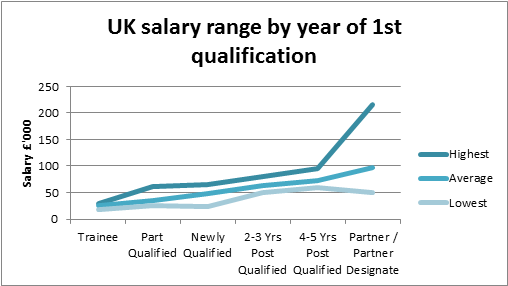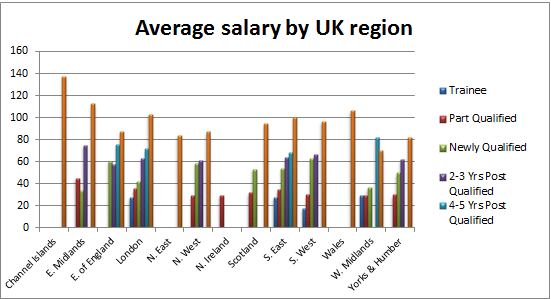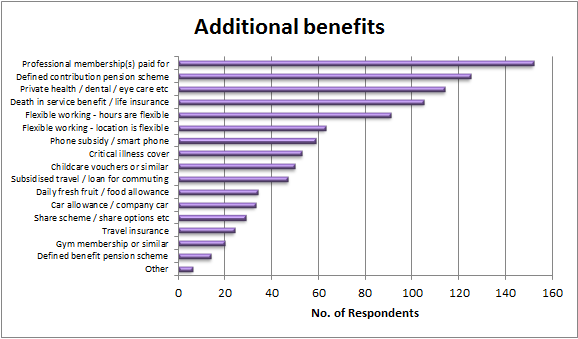In the patent profession, you could earn up to £45,000 before you’ve even finished your exams. Qualification increases your worth further, and can be used as a passport to international opportunities. Fellows and Associates use the data from their annual salary survey to highlight what you could be earning from Trainee to Partner level.
Being a patent attorney can be a very rewarding career and the salary increases can be frequent and significant as you progress through the examinations. In UK private practices, salaries are by and large linked to qualification status until the point you have qualified. Although in some instances, there can be differences in starting salaries for different technical specialisms depending on supply and demand. For example there was a recent trend for attorneys with an electronics background to earn more than their counterparts, although this seems to have subsided in the last 12 months.
Corporate vs. private practice
This article focuses on working in private practice for a firm of patent attorneys in the UK. Less and less corporations hire attorneys at trainee level, and a career in-house most frequently begins post qualification or at the very least when you have had a few years’ experience prior to qualification. Typically, attorneys can earn more in-house than they can in private practice for the years following qualification up until Partner level. However, once attorneys reach Partner status within a private practice their earning potential, in general, far outstrips what can be achieved in industry. Find out more about the difference between working in corporate and private practice here.
Average earnings
Patent attorneys do not move positions very frequently and salaries tend to increase in bursts. The market rate for a newly qualified attorney is around £60-65,000 but as you can see from the table below, salaries for attorneys who stay within the same firm can lag behind what they may be able to achieve on the open market. However, ‘newly qualified’ is to some extent ambiguous as some firms give a significant increase to their attorneys when they qualify in both Europe and the UK, others when they qualify in just one of the two jurisdictions.
|
PATENT SALARIES BY SENIORITY
|
||
| Responsibility level | In current firm | When moving firms |
| Trainee | £28,400 | – |
| Part qualified | £34,400 | £36,000-45,000 |
| Newly qualified | £48,300 | £60,000-65,000 |
| 2-3 years post qualified | £66,700 | £70,000-80,000 |
| 4-5 years post qualified | £75,300 | £80,000-100,000 |
| Salaried partner level* | £97,170 | £110,000-140,000 |
* These amounts are reflective of people who are Partners on a fixed remuneration (be it salary or self-employed fixed share), Equity Partners i.e. those who own a share of the firm could earn salaries/profit shares running into hundreds of thousands of pounds.
This graph gives an indication of what attorneys earn throughout their careers.
Salary by region
Contrary to popular belief, salaries outside of London are broadly the same as those within London. Certainly, being a patent attorney in another part of the UK would put you at no career disadvantage whatsoever compared with those based in London and in some cases you may find the experience gained is more well-rounded during training as there may be more direct contact with clients from an early stage. Applying for positions in London is highly competitive and it does not always occur to applicants to consider regional offices. As a result, those looking to enter the profession can have a better chance of succeeding when applying to regional firms, or firms with regional offices.
This graph demonstrates that salaries across the UK are broadly similar across the regions.
Benefits
50% of the respondents receive 25 days holiday per year, with 25% receiving more than 25 days annual leave (7% receiving more than 30 days), and 18% receiving less than 25 days.
‘Other’ included: members’ club membership and regional living allowance.
75% of respondents have their professional memberships paid for with 56% receiving private healthcare of some variety, as well as 52% receiving life insurance or a death in service benefit. A substantial number, 69% (2015: 70%), of respondents receive a pension of some sort, of which 7% (2015: 13%) have the elevated status of receiving a defined benefit pension (final salary scheme).
Being a patent attorney can be very financially rewarding and the chances of reaching the higher salaries are very good in comparison with other professional services sector positions. There is excellent job security and more often than not, there are more open positions than there are people to fill them (although getting into the profession in the first place as a new trainee remains very challenging).
The above data has come from Fellows and Associates’ annual salary survey completed by those working in the profession. Please note, as a result of us working across the Intellectual Property profession as a whole, there will be data relating to both trade mark and patent attorneys. You can see the full survey at www.fellowssurvey.com









